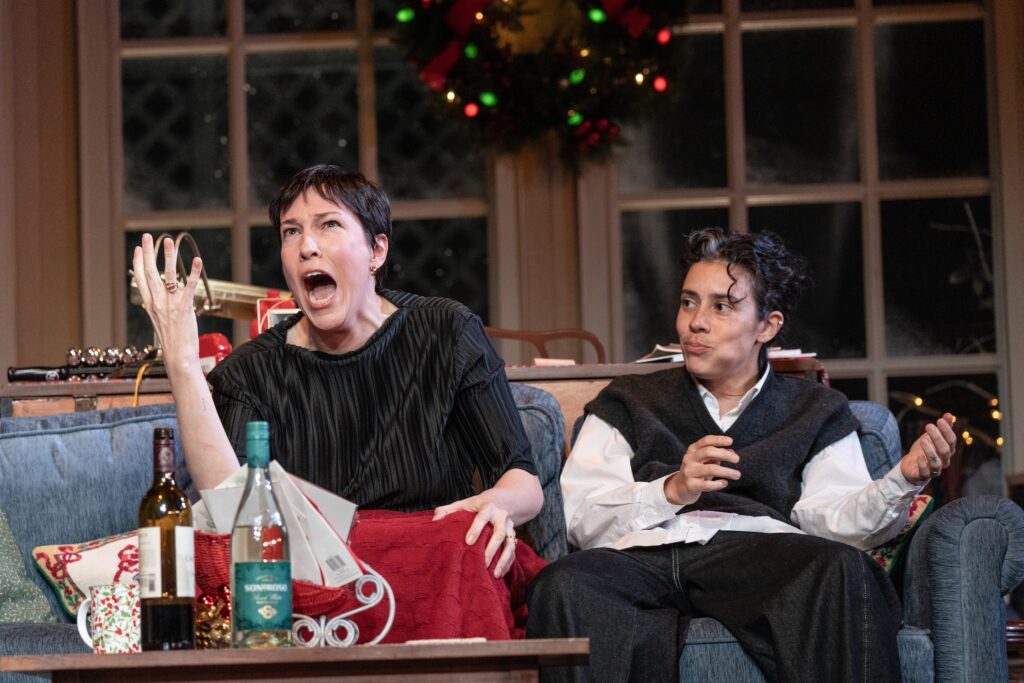Expect ‘Cult of Love’ To Burnish Leslye Headland’s Already Impressive Reputation
For all the crackling sardonicism in Headland’s writing, her compassion is equally compelling, if not more so. Under Trip Cullman’s typically astute direction, all the characters in ‘Cult’ are funny and touching, and none are villains.

At about this time last year, an Obie Award winner and two-time Pulitzer Prize finalist, Brendan Jacobs-Jenkins, made his Broadway debut as primary playwright with “Appropriate,” a blistering tragicomedy tracing the reunion of a glaringly dysfunctional family. Leslye Headland, who covers similar terrain in the new “Cult of Love,” is more widely known for her television and film work than her stage outings — though I suspect that’s about to change.
Ms. Headland, whose screen credits include Netflix’s “Russian Doll” and the Disney+ series “The Acolyte,” has had numerous projects produced off-Broadway and in regional theater, among them her “Seven Deadly Plays” cycle, which includes “Bachelorette,” inspired by gluttony and adapted into a movie in 2012.
In “Cult,” which had its premiere at Los Angeles several years ago, the central sin is pride. We meet the Dahl family: Ginny and Bill, both in their 60s, and their four adult children, two daughters and two sons, who have gathered for their annual Christmas celebration. For reasons that will become clear later in the one-act play, the youngest, Diana, has recently moved back in with her parents along with her husband, James, an Episcopal priest, and their baby; also, she’s pregnant.
The eldest, Mark, who studied to be a priest but decided to pursue a career in law instead, is there with his wife, Rachel. The second eldest, Evie, is newly married — to a woman, Pippa, who’s also in attendance though clearly very much out of her element from the moment the curtain rises, on the Dahls singing the first of numerous religious carols sprinkled throughout the play.

Music plays a central role in “Cult,” in fact; several actors play instruments — Zachary Quinto, as Mark, strums the banjo, while Mare Winningham, an accomplished singer/songwriter, plays guitar as Ginny — and their lovely vocal harmonies contrast sharply with the discord that prevails through much of the party.
At first, it’s suggested that Bill and Ginny’s younger son, Johnny, may be a prime source of tension: A recovering addict, he delays dinner by turning up late, much to the frustration of his siblings. References to his past behavior leave us wondering if he’ll arrive at all, in fact, and when he does, it’s with a mysterious young woman, Loren, whose first two words include an expletive.
“I don’t know why you insist on … being so dramatic about your brother,” Ginny chides her children. “When you should be loving him. And supporting him.”
Alas, Ginny’s own methods of expressing love and support seem increasingly suspect as the play progresses, as do her husband’s. Both are pious Christians, and Ginny in particular approaches her faith with a rigid and at times twisted morality that can be both comical and appalling. We learn that her sons and daughters weren’t allowed to stay over at friends’ houses as kids, because “the second highest rate of or way children are molested is having sleepovers.”
Bill, for his part, just wants everyone to get along, but he seems dominated by his wife and haunted by earlier influences. “I don’t see why we can’t all just love each other,” he says at one point, noting that he loves everyone. “Except my dad. And I don’t even really hate him. He’s just … a sick person who walks among us.”
Little wonder that the younger Dahls all seem damaged, and that all but one have rejected their parents’ faith. The one who hasn’t, Diana, emerges as the most disturbed of all, and becomes the biggest catalyst for strife at this gathering.
If you’re picturing an assault on Christianity, an easy and popular target among artists in recent years, think again: Ms. Headland has something more nuanced in mind, and for all the crackling sardonicism in her writing — especially well served by Rebecca Henderson’s marvelously acidic Evie and Christopher Sears’s sublimely arch Johnny — her compassion is equally compelling, if not more so.
Under Trip Cullman’s typically astute direction, all the characters in “Cult” are funny and touching, and none are villains. Ginny and Diana say the vilest things, but Shailene Woodley, in her Broadway debut, gives the latter a skewed ingenuousness that inspires sympathy more than disgust, while Ms. Winningham brings a brittleness and a profound sense of repression to her role, qualities that can break hearts.
Ms. Headland dips into her own proselytizing at times; Mark, for example, gets to lecture Ginny — who, naturally, won’t accept that Evie is gay — on how her beliefs “align you with centuries, epochs, of patriarchy and violence,” and reflect “intolerance of the very people Jesus Christ loved and died for.” Yet he also delivers the play’s most intriguing and moving monologue, which considers the need for a higher power.
“We’re designed to love God,” Mark posits. “We have this incredible capacity to love something so large and unknowable but the human experience is one of such complicated smallness that choosing God is impossible. Being human is being heartbroken.”
Perhaps, but as this play ultimately reminds us, we can also find love and solace in human relationships, however messy they may be. Regardless of your faith, or lack of it, it’s a reassuring message, and a fitting one at this time of year.

